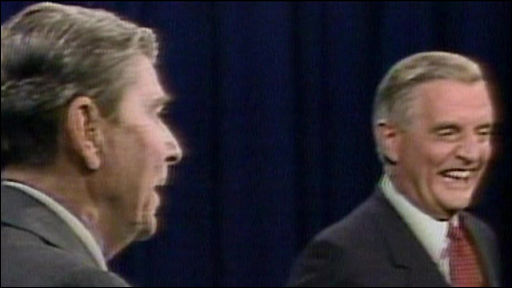Religion and politics — the third rail that can transform a polite dinner table conversation into something that more resembles a pay-per-view wrestling match. But as we look down the barrel of the 2016 presidential election, there is little doubt that the electricity will flow and turn more than a few quiet family dinners and social gatherings into cringe-worthy moments of mayhem.
And, in large part, television will be the catalyst.
Based on the debris field from the most recent televised presidential debates in late 2015, the carnage has already begun. But don’t lose heart — political mudslinging is nothing new in American politics.
If you question that, I suggest you look at some of the personal letters and public newspaper accusations that John Adams and Thomas Jefferson slung toward one another. And if you need further evidence that the good old days were not necessarily kinder and gentler, keep in mind Alexander Hamilton was shot dead in a duel with a sitting American vice president, who himself came very close to the presidency of the United States.
As if American politics weren’t dramatic enough already, somebody invented television during the 20th century and all of a sudden presidential politics became a full-body contact sport in a way town criers or local newspaper editors could never dream of stirring up. From the start, politics and television have not always been a happy marriage, mainly because the heightened sense of “performance” television acerbated a public square already rife with political theatrics.
George Washington fended off a mutiny of the Continental Army by standing in front of his officers and defending the fledgling, if somewhat dysfunctional Congress — stop me if you’ve heard that complaint before. Toward the end of this most incredible nation-saving speech, which cautioned patience and honor and duty to his officer staff, Washington reached into his coat, pulled out a pair of glasses and said, “Gentlemen, you will permit me to put on my spectacles, for I have not only grown gray but almost blind in the service of my country.”
Needless to say, Washington had his men eating out of his hand after that. Exactly three generations later, the Lincoln/Douglas debates took political theater to new heights. Although there is obviously no audio evidence of the Lincoln/Douglas debates, both men were noted for their rhetorical brilliance and the written accounts of these debates is the stuff of political legend.
As these historical nuggets prove, television may not have invented political theater, yet by its very nature it amplifies political action and makes it increasingly unforgiving. Eisenhower, though no great orator, looked every part the general in command on television, and his bookish challenger Adlai Stevenson was swamped in two national elections in a row. Nixon didn’t look as good as Kennedy on black and white television in 1960 and what he had to say was less effective for it.
Regardless of what anyone may believe about Ronald Reagan’s brand of politics, there is no debate from either side of the aisle that he knew how to handle a television camera. During his second presidential campaign, Reagan — by then in his mid-70s — performed sub-par in his first televised debate with challenger Walter Mondale.
He was not on his game, he looked tired and television made him look every minute of his 73 years. Mild panic in the party set in and there was actual talk that challenger Walter Mondale might be able to gain some ground. All eyes turned to the second televised debate.
The second debate had not been more than a few moments old when the issue of age was brought up by one of the panelists. More precisely, Reagan was asked point bank if he was too old to be president.
Unfazed, Reagan mustered every ounce of his television acumen and wryly cocked his head telling the panelist, “I will not make age an issue of this campaign. I am not going to exploit, for political purposes, my opponent’s youth and inexperience.”
The audience broke out in laughter. Reagan’s opponent, the 56-year-old “youngster” Walter Mondale, broke out in laughter too, and, once again, television had been used to optimum effect by a candidate.
In the 1988 vice presidential debate, a very young Dan Quayle was set up and knocked down like an 8-10 split by the democratic candidate Lloyd Bentsen when the elder statesmen used Quayle’s own argument about having more experience than John F. Kennedy when Kennedy was elected.
Bentsen looked straight into the camera and said, “I knew Jack Kennedy. Jack Kennedy was a friend of mine. Senator, you are no Jack Kennedy.”
Game over.
Since neither political party has a monopoly on sound Catholic social teaching, the upcoming election in 2016 poses more than its share of dilemmas for an informed Catholic voter to ponder. You’re all on your own on that one.
But I do wonder what a television camera would have done to Moses’ speech impediment or Jesus’ solitary act of righteous anger at the moneychangers in the Temple. And, although I am much less convinced that political rather than spiritual solutions are the cure for what ails us, when it comes to the upcoming election cycle I’m sure I’ll be glued to my television.
It may not be good politics, but it will definitely be great theater.
Robert Brennan has been a professional writer for more than 30 years, including many years in the television industry.

